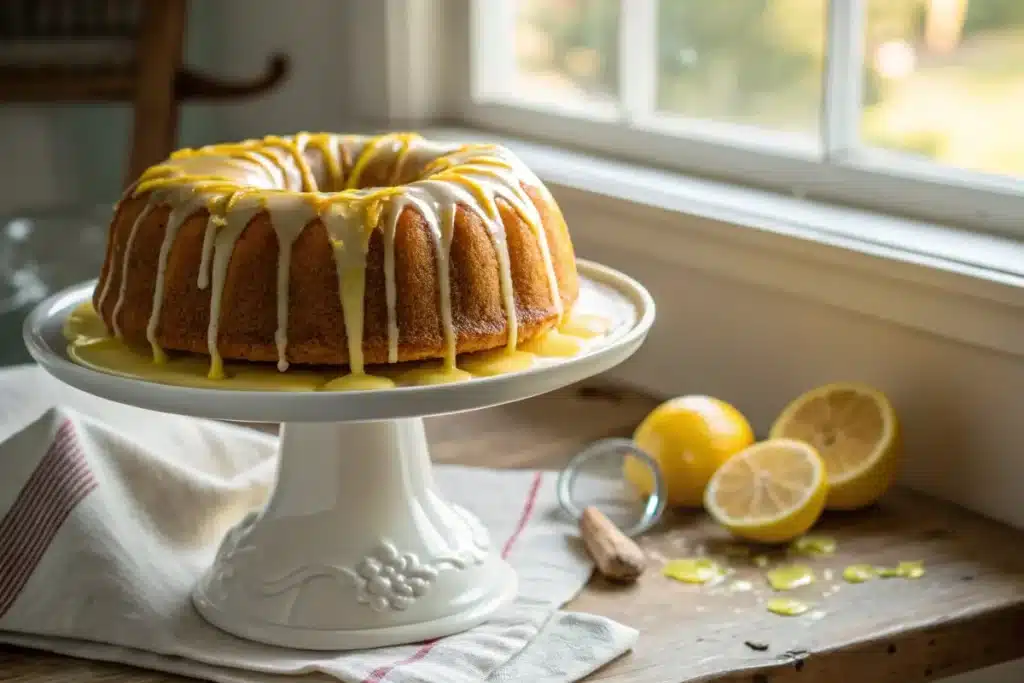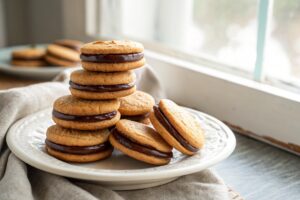Lemon Bundt Cake always takes me back to my grandma’s kitchen. It was warm, and delicious and unforgettable , and the air smelled like fresh lemons with sweet . She would take out this golden shiny cake from the oven, pour on a sweet glaze, and somehow it was always perfectly slightly wet. It became the highlight of every Sunday dinner.

That’s the charm of a good lemon Bundt cake. It’s simple, nostalgic, and full of bright flavor. In this article, I’ll accompany you through how to make your own slightly wet and zesty masterpiece, with all the tips and tricks that make it unforgettable.
Lemon Bundt Cake Ingredients and Easy Substitutions
Essential Ingredients for the Best Lemon Bundt Cake
A great lemon Bundt cake starts with quality ingredients that balance bright citrus with rich texture. Here’s what you’ll need and why each one matters:
- All-purpose flour – Offers just the right amount of structure without making the cake dense.
- Granulated sugar – Sweetens the batter and helps create that golden crust.
- Unsalted butter – Brings in richness and creaminess. Always go for high-quality butter for the best flavor.
- Eggs – Bind everything together and help the cake rise.
- Sour cream or Greek yogurt – Keeps the cake tender and moist.
- Fresh lemons – You’ll use both the zest and juice. The zest is key for a vibrant lemon flavor.
- Vanilla extract – Adds warmth and balances the tartness.
- Baking powder and baking soda – These leavening agents give the cake lift and softness.
- Salt – A pinch goes a long way to enhance flavor.

Use organic lemons when possible. Their zest is free of wax and full of intense citrus oil that brings your cake to life.
Ingredient Swaps: Healthier or Vegan Options
Don’t have everything on hand? Or baking for someone with dietary restrictions? No problem. Here are some smart swaps that won’t sacrifice texture or taste.
- Butter substitute: Use a vegan butter or coconut oil. Make sure it’s solid, not melted.
- Egg replacement: For each egg, use 1 tablespoon of ground flaxseed mixed with 3 tablespoons of water (let it sit 5 minutes).
- Dairy-free alternative: Swap sour cream or yogurt for plant-based yogurt like almond, soy, or coconut.
- Gluten-free version: Use a 1:1 gluten-free flour blend designed for baking. Look for one with xanthan gum for proper structure.
- Sugar alternative: Use coconut sugar or a monk fruit blend for a lower glycemic option. Just be mindful—it may slightly alter color and flavor.
These adjustments are perfect for modern kitchens without compromising the flavor or moisture that makes a lemon Bundt cake so special.
Print
Moist Lemon Bundt Cake
- Total Time: 1 hour 15 minutes
- Yield: 12 servings 1x
Description
Ingredients
For the Cake:
-
1 teaspoon baking powder
-
½ teaspoon baking soda
-
½ teaspoon salt
-
1 cup unsalted butter (room temperature)
-
1¾ cups granulated sugar
-
3 large eggs
-
1 cup sour cream or Greek yogurt
-
Zest of 2 lemons
-
¼ cup fresh lemon juice
-
1 teaspoon pure vanilla extract
2½ cups all-purpose flour
For the Lemon Glaze:
-
2–3 tablespoons fresh lemon juice
-
1 teaspoon lemon zest (optional)
1 cup powdered sugar
Instructions
Preheat your oven to 325°F (163°C). Generously grease and flour a 10–12 cup Bundt pan.
In a medium bowl, whisk together flour, baking powder, baking soda, and salt.
In a large bowl, beat butter and sugar until light and fluffy (about 3–5 minutes).
Add eggs one at a time, mixing well after each addition.
Stir in lemon zest, lemon juice, and vanilla.
Add dry ingredients and sour cream alternately, starting and ending with the flour. Mix just until combined.
Pour the batter into the pan and smooth the top. Tap the pan on the counter to remove air bubbles.
Bake for 55–65 minutes, or until a toothpick inserted comes out with a few moist crumbs.
Cool in pan for 15 minutes, then invert onto a wire rack and let cool completely.
Make the glaze: whisk powdered sugar with lemon juice until smooth. Drizzle over the cooled cake.
Notes
Use fresh lemons only—zest and juice make all the difference.
Grease every crevice of your Bundt pan to ensure a perfect release.
Let glaze set 30 minutes before slicing for best results.
Find this recipe on Pinterest → on Pinterest
- Prep Time: 15 minutes
- Cook Time: 60 minutes
- Category: Dessert
- Method: Baking
- Cuisine: American
Nutrition
- Serving Size: 1 slice (approx. 1/12 of cake)
- Calories: 410
- Sugar: 35g
- Sodium: 230mg
- Fat: 21g
- Saturated Fat: 12g
- Carbohydrates: 50g
Keywords: lemon Bundt cake, moist lemon cake, lemon glaze cake, Bundt cake recipe
How to Choose the Right Lemon Zest and Juice
This part makes or breaks your cake. The zest holds the real lemony punch, much more than the juice. Always zest the lemon before juicing it and avoid going too deep into the bitter white pith. A microplane zester works best for a fine, fluffy zest that folds into your batter without clumping.
For the juice, fresh-squeezed lemons are a must. Bottled lemon juice is convenient, but it lacks the vibrant oils that come from freshly cut fruit. For one cake, you’ll need the zest of 2 lemons and about ¼ cup of juice. Don’t skip either—you need both to hit that perfect citrus balance.
What Sets a Lemon Bundt Cake Apart from Regular Cakes
How Bundt Pans Affect Baking and Texture
Bundt pans aren’t just stylish—they’re smart. Their fluted shape and central hole help your lemon Bundt cake bake evenly, giving it a golden crust and moist center. The increased surface area means more contact with heat, which creates that signature texture. Unlike flat pans, Bundt pans cook the inside and outside at the same time, reducing underbaked spots and dry edges.
Shaping, Cooling, and Serving a Bundt vs. Layer Cake
Baking a Bundt cake is a little different from baking a layer cake, and the presentation is part of the appeal. Instead of stacking and frosting layers, a lemon Bundt cake stands on its own. The dramatic curves and ridges do most of the decorating work for you.
Here are a few key differences when handling each:
| Feature | lemon Bundt Cake | Regular Cake |
|---|---|---|
| Pan | Decorative ring with a central tube | Flat round or rectangular pan |
| Structure | Thick, dense, and tall | Light or layered |
| Cooling Method | Cooled in pan for 10–15 minutes | Cooled completely in pans |
| Decorating Style | Glaze or light dusting | Frosted layers or covered in icing |
lemon Bundt cake also need a little extra care when removing them from the pan. Make sure to grease every nook and cranny—use a baking spray with flour or a butter-flour combo. Let the cake cool for 10 to 15 minutes before inverting. Too soon, and it falls apart. Too late, and it sticks.
Bundt Cake vs. Pound Cake: What’s the Real Difference?
People often confuse Bundt cakes with pound cakes, especially when it comes to lemon-flavored desserts. While they may be baked in similar pans, they aren’t the same thing.
A pound cake traditionally uses a pound each of butter, sugar, flour, and eggs, making it super dense and rich. A lemon Bundt cake, on the other hand, is lighter and often uses ingredients like sour cream or buttermilk to keep things moist and fluffy.
Also, Lemon Bundt cake are more versatile. You can get creative with the batter—adding zest, extracts, fillings, or even swirl layers. With pound cake, you’re usually sticking to the basics.
How to Make the Best Lemon Bundt Cake Step by Step
Step-by-Step Instructions with Pro Tips
Making a perfect lemon Bundt cake doesn’t have to be complicated. Follow this simple method, and you’ll bake a moist, flavorful cake every single time.
- Preheat your oven to 325°F (163°C)
Low and slow is the key to baking a dense cake evenly. - Grease your Bundt pan generously
Use butter and flour or a baking spray made for Bundt pans. Get into every curve and corner. - Cream butter and sugar until light and fluffy
This step adds air for a tender crumb. Beat for 3–5 minutes.

- Add eggs one at a time
Mix well after each egg to avoid curdling and keep the batter smooth. - Mix in lemon zest and vanilla extract
This is where your flavor starts to bloom. - Alternate dry ingredients and sour cream
Add flour mixture and sour cream in turns. Start and end with flour. Don’t overmix—just combine. - Pour into pan and smooth the top
Give the pan a gentle tap on the counter to remove air bubbles.

- Bake for 55 to 65 minutes
Start checking around 50 minutes. A toothpick should come out with a few moist crumbs. - Cool in pan for 10 to 15 minutes
Then gently flip onto a wire rack and let it cool completely.

- Drizzle with glaze or dust with powdered sugar
Finish with a fresh lemon glaze for that classic shine and sweet tang.
Mixing Techniques That Prevent Dryness
The way you mix your batter has a huge impact on the final cake. Always start by creaming butter and sugar until it’s pale and fluffy. This builds the structure and creates tiny air pockets. When you add the eggs, keep the mixer on medium speed and scrape down the bowl as needed.
Once you start adding flour, switch to low speed or mix by hand. Overmixing at this stage leads to gluten formation, which can toughen your lemon Bundt cake. Fold gently and stop as soon as everything looks combined.
A rubber spatula is your best friend here. It helps you scrape the bowl without breaking up the batter.
Baking Time and Temperature Explained
Bundt cakes are thicker and denser than regular cakes, so they need a lower temperature to cook through without burning. That’s why 325°F works best. Baking too hot can brown the outside too quickly while leaving the inside raw.
If your oven has hot spots, rotate the pan halfway through baking. Use an oven thermometer for accuracy—many home ovens run 10–15 degrees off. A slightly underbaked cake can collapse or turn gummy, while overbaking dries it out.
Use the toothpick test in multiple spots to be sure. You want moist crumbs, not a wet batter or bone-dry stick.

Kitchen Tools You’ll Need for a Lemon Bundt Cake
To get great results, having the right tools makes all the difference. Here’s what you’ll want on hand before you start baking:
- 10–12 cup Bundt pan
The star of the show. Look for one with nonstick coating and deep ridges for best shape and easy release. - Stand mixer or hand mixer
Essential for creaming butter and sugar properly. - Mixing bowls
At least two medium-to-large bowls: one for dry ingredients, one for wet. - Microplane zester
The easiest way to zest lemons finely without the bitter pith. - Citrus juicer or reamer
Helps you get every drop of juice out of your lemons. - Rubber spatula
Perfect for folding batter gently and scraping the bowl clean. - Cooling rack
Allows air to circulate and cool the cake evenly after it’s flipped out of the pan. - Whisk and measuring cups/spoons
Precision counts when you’re baking—always measure both dry and wet ingredients accurately. - Toothpicks or cake tester
To check for doneness without guessing.
Optional, but helpful:
- Offset spatula – For spreading glaze evenly
- Pastry brush – If you’re brushing on a lemon syrup or melted butter
- Baking spray with flour – Ensures the cake releases cleanly from the pan
What Makes a Lemon Bundt Cake Moist and Tender
The Role of Sour Cream, Buttermilk, and Yogurt
If you’ve ever taken a bite of a dry Bundt cake, you know how disappointing it can be. Moisture is everything in baking, and when it comes to a lemon Bundt cake, adding the right ingredients makes all the difference. Sour cream, buttermilk, and full-fat yogurt are secret weapons for texture. Why? Because they’re packed with fat and acidity, which tenderize the crumb and add richness.
Sour cream gives your cake a creamy density without making it heavy. Buttermilk, with its tangy punch, reacts beautifully with baking soda to lift the cake. And plain Greek yogurt? It delivers protein and moisture in a perfect balance. These dairy ingredients aren’t just about flavor—they’re about chemistry that keeps your cake soft for days.
If you’re dairy-free, no worries. Coconut yogurt and oat milk with a squeeze of lemon juice can mimic the magic, giving your lemon Bundt cake that same luscious bite.
Why Room Temperature Ingredients Matter
Baking is a science, and room temperature ingredients are like turning your oven’s GPS on before starting. When butter, eggs, and dairy are at room temperature, they mix better, hold more air, and create a smoother batter. That air gets trapped during mixing and helps your lemon Bundt cake rise evenly.
Cold eggs can curdle your batter. Cold butter won’t cream properly with sugar. Cold milk? It’ll seize the batter and slow down the baking process. Set your ingredients out 30 to 60 minutes ahead, and you’re setting yourself up for a soft, fluffy cake that bakes like a dream.
Common Moisture Mistakes to Avoid
Even the best recipe can fall flat with a few easy-to-make mistakes. One of the most common is overmixing the batter. When you stir too much, you develop gluten in the flour, which leads to a tough cake. Instead, mix until the dry ingredients are just combined.
Overbaking is another cake-killer. A few extra minutes in the oven can zap all the moisture. Start checking your cake at the 45-minute mark and use a toothpick test. When it comes out with a few moist crumbs, it’s done.
Lastly, don’t skip the glaze. A light lemon syrup poured over a warm cake seeps into every crevice of the Bundt, locking in moisture and boosting flavor.
PART 6: Frosting and Glazing Your Lemon Bundt Cake
Classic Lemon Glaze Recipe and Variations
A simple lemon glaze takes your lemon Bundt cake from good to unforgettable. It soaks into the cake, adds a punch of citrus, and gives that glossy bakery-style finish. Best part? It’s super easy to make.
Basic Lemon Glaze Recipe:
- 1 cup powdered sugar
- 2–3 tablespoons fresh lemon juice
- 1 teaspoon lemon zest (optional)
Whisk everything together until smooth and pourable. You want it thick enough to cling, but thin enough to drizzle.

Variation Ideas:
- Creamy Lemon Glaze: Add 1 tablespoon of melted butter and a splash of milk.
- Vanilla-Lemon Glaze: Stir in ½ teaspoon vanilla extract for warmth.
- Lemon-Poppy Glaze: Add a pinch of poppy seeds for texture and visual pop.
- Tangy Yogurt Glaze: Replace half the sugar with plain Greek yogurt for a tart, creamy twist.
Always glaze the cake once it’s fully cooled. If it’s warm, the glaze will melt and slide right off.
Cream Cheese Icing vs. Sugar Glaze: What’s Better?
So which one should you use—cream cheese frosting or a simple glaze? It depends on your vibe.
A lemon glaze keeps things light, bright, and not overly sweet. It lets the citrus flavor shine and sets with a pretty finish.
A cream cheese icing, on the other hand, is rich, tangy, and perfect for a slightly more decadent dessert. It pairs beautifully with lemon, adding a layer of creaminess that complements the cake’s citrus punch.
Use cream cheese icing when you want to impress at a party or holiday table. Stick with lemon glaze when you’re going for casual, everyday magic.
You can also combine them. Drizzle lemon glaze first, let it set, then pipe a thin swirl of cream cheese on top for layered flavor and style.
How to Get the Drizzle Right Every Time
Drizzling might sound easy, but the details matter. Here’s how to do it like a pro:
- Wait until the cake is completely cool. Warm cake melts glaze and makes it slide off.
- Use a spoon, piping bag, or pour straight from a cup. For neat results, go slow and steady.
- Let the glaze fall into the ridges. Start at the top and let it naturally trickle down.
- Set the cake on a cooling rack over a tray. This catches the excess and keeps your counter clean.
- Let it sit 20–30 minutes before serving. The glaze will firm up and add a subtle crunch.
Want to go fancy? Add edible flowers, candied lemon slices, or a sprinkle of zest on top. It’s not just about flavor—it’s about visual delight.
Decorating and Presenting Your Lemon Bundt Cake
Tips for Picture-Perfect Cakes

A lemon Bundt cake already has a beautiful shape thanks to the pan—but a few simple touches can make it truly eye-catching. First, always let the cake cool completely before decorating. A warm cake will melt glazes and icings, ruining your design.
To make your presentation pop:
- Use a light dusting of powdered sugar for a classic, elegant look.
- Drizzle glaze in layers to create depth—let the first set, then add a second for shine.
- Pipe cream cheese frosting into the grooves for a bakery-style effect.
- Plate it on a white or wooden cake stand to contrast the golden color.
If you’re baking for a special occasion, match your decorations to the event. A few fresh flowers or thin lemon slices around the base of the cake can make it feel wedding-ready or party-perfect in minutes.
Garnishes: Edible Flowers, Candied Lemons, and More
Garnishing adds texture, flavor, and flair. Here are some ideas that pair perfectly with lemon:
- Candied lemon slices – Sweet and chewy with a strong citrus punch.
- Fresh mint leaves – Add color and a refreshing aroma.
- Edible flowers – Nasturtiums or pansies create a whimsical finish.
- Extra lemon zest – Bright yellow flakes sprinkled just before serving.
- Toasted coconut flakes – For a tropical touch and a little crunch.
A pro tip? Less is more. Choose two or three complementary garnishes and place them strategically rather than covering the whole cake.
Storage Ideas: How to Keep It Fresh Longer
Once your lemon Bundt cake is baked and beautifully decorated, you’ll want to keep it fresh as long as possible. Good news—it stores really well.
- At room temperature: Store under a cake dome or in an airtight container. It stays moist for up to 3 days.
- In the fridge: If your cake has cream cheese icing, refrigerate it. Just let it come to room temp before serving so the texture softens.
- In the freezer: Wrap individual slices tightly in plastic wrap and freeze. When ready to enjoy, thaw overnight in the fridge or for 30 minutes at room temp.
Avoid storing it uncovered or in a dry environment—this can zap the moisture quickly.
What is the secret to moist Bundt cake?
The secret lies in balancing moisture-retaining ingredients like sour cream or yogurt, not overbaking, and using the correct pan and baking temperature.
What is the difference between a Bundt cake and a regular cake?
Bundt cakes use a fluted pan with a central hole, which affects baking time and structure, while regular cakes are typically baked in flat pans without the intricate designs.
What is a Tom Cruise Bundt cake?
It’s a white chocolate coconut Bundt cake gifted by Tom Cruise every holiday, known for its rich flavor and cult status among celebrities.
What is the best flavor of Bundt cake?
Lemon is a top choice for its zesty freshness, followed closely by chocolate and red velvet, depending on season and region.
Love baking as much as we do? If cookies are your thing too, don’t miss our Toll House Cookie Recipe for a classic, chewy favorite.
Looking for more dessert inspiration?
Check out our Pinterest boards filled with beautiful cakes, cookies, and baking ideas at on Pinterest.



